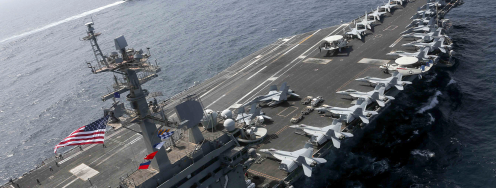Nukes and Cyberthreats: a Dangerous Mix
On the radar: Nuclear facilities at risk from cyber attack; Cruise missile plans are dangerous and destabilizing; Test ban treaty ratification long overdue; Arak reactor now coreless; Iran deal expedites sailors’ release
Troubling revelations on nuclear cybersecurity - “Twenty nations with significant atomic stockpiles or nuclear power plants have no government regulations requiring minimal protection of those facilities against cyberattacks, according to a study by the Nuclear Threat Initiative. The report also concludes that President Obama’s global initiative to sweep up loose nuclear material, which will be the subject of Mr. Obama’s third and final nuclear security summit this March, has slowed substantially,” writes David Sanger for The New York Times.
--“Twenty-four nations still have more than 2.2 pounds of weapons-usable nuclear material, ‘much of it still too vulnerable to theft.’” The study concluded that, “too many states require virtually no effective security measures at nuclear facilities to address the threat posed by hackers.” Of the states examined, “twenty countries failed on all the indicators.” Read the full story here. http://nyti.ms/1Q0f3D9
See also- The Nuclear Threat Initiative 2016 Nuclear Security Index Report http://bit.ly/1KfBYWG
Nuke cruise missiles are bad for U.S. security - “The Obama administration wants to build a new aircraft-launched, nuclear-armed cruise missile — the Long-Range Stand-Off (LRSO) weapon — which will be significantly more capable than the nuclear-armed, air-launched cruise missile (ALCM) scheduled for retirement in 2030.” This plan makes little sense, writes Stephen Young for Defense News.
--“The LRSO is designed for nuclear war fighting. Unfortunately, for that very reason, deploying this weapon will actually make the United States less secure... US interests are best served by ensuring that all conflicts remain non-nuclear… Once any country crosses the nuclear threshold, the calculus changes dramatically. As President Ronald Reagan made clear, ‘a nuclear war cannot be won and must never be fought.’” Read the full piece here. http://bit.ly/1n1Sncw
New nuke tech is dangerous - “The B61-12 will be America's first nuclear standoff bomb — meaning one designed to be delivered against targets at a distance safe for the aircraft doing the bombing — thanks to a pair of steerable fins that allow warplanes to lob the bomb from afar. An internal guidance system — which doesn't use GPS — gives the B61-12 an accuracy of around 30 meters. After release, a pair of stabilizing rockets ... fire to induce spin,” writes Kyle Mizokami for Popular Mechanics.
--“All of these features — the standoff capability, new level of accuracy, and ability to set the bomb to a low explosive yield — has critics charging that the new version of the bomb is not just a ‘life extension program’ for the B61, but a new weapon in a time when slowing or stopping the development of nukes worldwide is in everyone's best interest. Furthermore, the critics — including former U.S. Secretary of Defense William Perry — believe that policymakers, including the President, could talk themselves into using such a precise, low-yield nuclear weapon.” Find the full story here. http://bit.ly/1J4Zr1G
Tweet - @FAScientists: North Korea Faked Missile Test Video, Group Says via @nytimes nyti.ms/22Zi0uL
Implementation day expected on Friday - “Abbas Araqchi, Iran’s deputy foreign minister and senior nuclear negotiator, said on Wednesday that the UN nuclear watchdog, the International Atomic Energy Agency (IAEA), was due on Friday to verify that Tehran had fulfilled all its obligations under the nuclear agreement, including unplugging thousands of centrifuges and significantly reducing its stockpile of low-enriched uranium,” report Saeed Kamali Dehghan and David Smith for The Guardian.
-- “In Washington, John Kerry, the US secretary of state, said the implementation of the nuclear deal was likely in the coming days. ‘As agreed, Iran is now well on its way to dismantling critical elements of its nuclear facilities,’ he told an audience at the National Defense University in Washington. ‘Just yesterday, the foreign minister reported to me that the calandria of the plutonium nuclear reactor is now out and in the next hours it will be filled with concrete and destroyed.’” Full story here. http://bit.ly/1nj9nuA
Tweet - @Iran: #EU extends #Iran #sanctions relief in technical measure ahead of deal http://bit.ly/1Skj9JQ #IranDeal #JCPOA
Arak reactor core removed - “Iran has removed the sensitive core of its Arak nuclear reactor and U.N. inspectors will visit the site on Thursday to verify the move crucial to the implementation of Tehran's atomic agreement with major powers, state television said on Thursday,” writes Parisa Hafezi for Reuters.
--“Removal of the core from the Arak reactor will largely eliminate its ability to yield nuclear bomb-grade plutonium, and was one of the toughest issues to resolve in the long nuclear negotiations with the six powers… ‘We are ready for the implementation day of the deal,’ spokesman for Iran's Atomic Energy Organization Behrouz Kamalvandi said.” Full story here. http://reut.rs/1PtgiYQ
Diplomacy pays off- “The Iranian response to this week's incident in the Gulf was about as proper as one can imagine. After enough questioning for the Iranians to know what was going on, the U.S. crew and their boats were escorted safely back to their own fleet less than 24 hours after being detained. The only thing from which the ten U.S. sailors appear to have suffered during their few hours on Iranian soil … is boredom,” writes Paul Pillar for The National Interest.
--“Another conclusion concerns the value of the direct U.S.-Iranian diplomacy that was established with negotiation of the nuclear accord after so many years of not talking. In particular, the channel between Secretary of State Kerry and Foreign Minister Zarif, a channel greatly developed during the course of the nuclear negotiations, evidently was valuable in quickly and successfully resolving this week's incident.” Read the full story here. http://bit.ly/1ZxwKBS
See also- “The Added benefits of diplomacy,” by Benjy Cannon for the J Street Blog. http://bit.ly/1OkgcVI
Tweet - @zbig: The US media has conveniently missed that Iran’s release of US sailors is a direct result of the dialogue created by the Iran deal.
Time to ratify the test ban treaty - “This year marks the twentieth anniversary of the Comprehensive Nuclear-Test-Ban Treaty (CTBT) agreement, so the timing of the latest nuclear blast from North Korea is pertinent. The country’s continued testing — this is its fourth test since 2006 — puts it on a path to developing miniaturized warheads that could be placed on missiles, risking an arms race in the region and increased global instability,” argues a Nature editorial.
--“The United States has an opportunity to show leadership. By ratifying the CTBT, it would put huge pressure on China, India, Pakistan and other countries to do likewise. Iran, having scored a major diplomatic success with its nuclear deal with six world powers, is also in a strong position to support ratification. That would leave the signature of North Korea, probably the most recalcitrant non-signatory, for the CTBT to be able to enter into force. But as the Iran deal and the Paris climate negotiations show, diplomacy can prevail in the most difficult circumstances.” Read the full piece here. http://bit.ly/1SOEeex
Tweet - @AtomicAnalyst: 30 years ago this week, Mikhail Gorbachev issued a detailed proposal for eliminating all nuclear weapons by 2000.
Quick Hits:
--“Putin keeps close eye on US missile defense efforts,” by John Vandiver for Stars and Stripes. http://1.usa.gov/1Q0cMrz
--“Fears voiced as nuclear weapons are transported through the Vale of Leven,” by Martin Laing for Daily Record. http://bit.ly/1P0C9fX
--“Listen to the Booms of North Korea's Nuclear Weapons Tests,” by Sam Blum for Inverse. http://bit.ly/1PtFxu3
Events:
--"A Personal Journey to Reduce the Nuclear Threat," featuring William Perry, former Defense Secretary. January 14 from 6:30-8:00 p.m. at the Commonwealth Club, 555 Post St., San Francisco. RSVP online. http://bit.ly/1Zxy0VN
--"Countering Weapons of Mass Destruction," featuring Rose Gottemoeller, Under Secretary of State for Arms Control and International Security; Nobuyasu Abe, former Under-Secretary-General of the United Nations for Disarmament Affairs; Andrew Weber, former Assistant Secretary of Defense for Nuclear, Chemical and Biological Defense Programs; and Narushige Michishita, National Graduate Institute for Policy Studies (Tokyo). January 14 from 1:30-3:00 p.m at the Center for American Progress, 1333 H St. NW, 10th Floor, Washington. RSVP online. http://ampr.gs/1JwFaSN
--“Ballistic Missile Defense System Update," featuring Vice Adm. James Syring, Missile Defense Agency and Thomas Karako, Center for Strategic and International Studies. January 19 from 2:00-3:00 p.m. at the Center for Strategic and International Studies, located at 1616 Rhode Island Ave. NW, Second Floor Conference Room, Washington. RSVP by email at intlsecurity@CSIS.org. http://bit.ly/1K0hQHU
--“Chinese Nuclear Thinking: U.S. Perspectives,” featuring Li Bin, Rose Gottemoeller and Linton Brooks. January 22 from 3:30-5:00 PM. Located at the Carnegie Endowment for International Peace, 1779 Massachusetts Avenue NW, Washington, DC. Register here. http://ceip.org/1N9xxfV
Dessert:
DoD gambles on Powerball - “The Department of Defense announced today that it has purchased five million Powerball tickets at a cost of $2 per ticket, with an aim of providing a funding windfall to the F-35 Joint Strike Fighter program,” jokes “Yossarian” for DuffelBlog.
--“The F-35 program has been beleaguered by cost overruns, with a projected lifetime program cost of at least $1.5 trillion. The estimated $1.5 billion dollar Powerball jackpot would amount to only one-tenth of one percent of the total program cost, but it’s an important step in the Pentagon’s search for additional sources of revenue in the face of Congressional questions about the program.” Read the full story here. http://bit.ly/1mVKFjF



